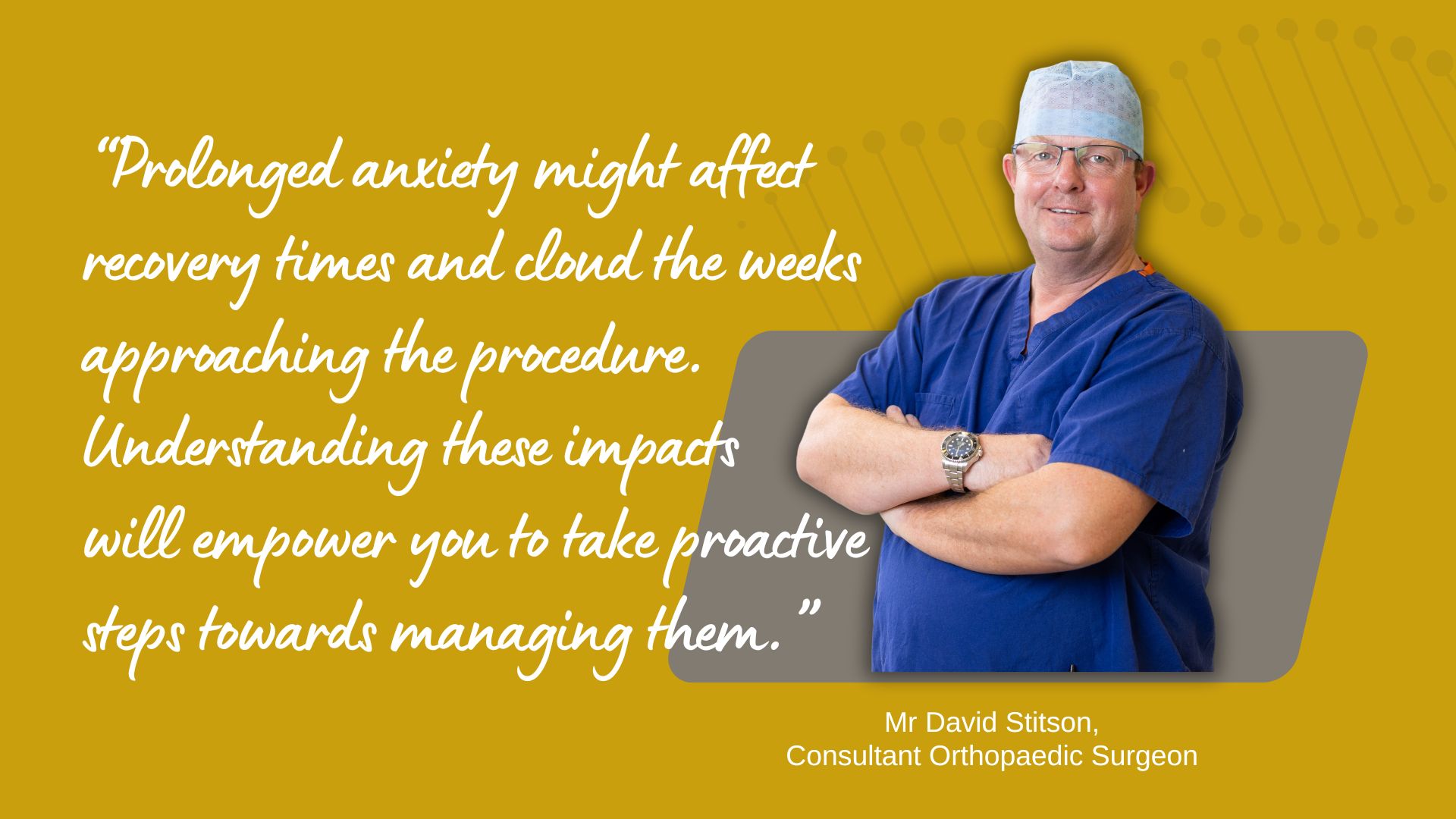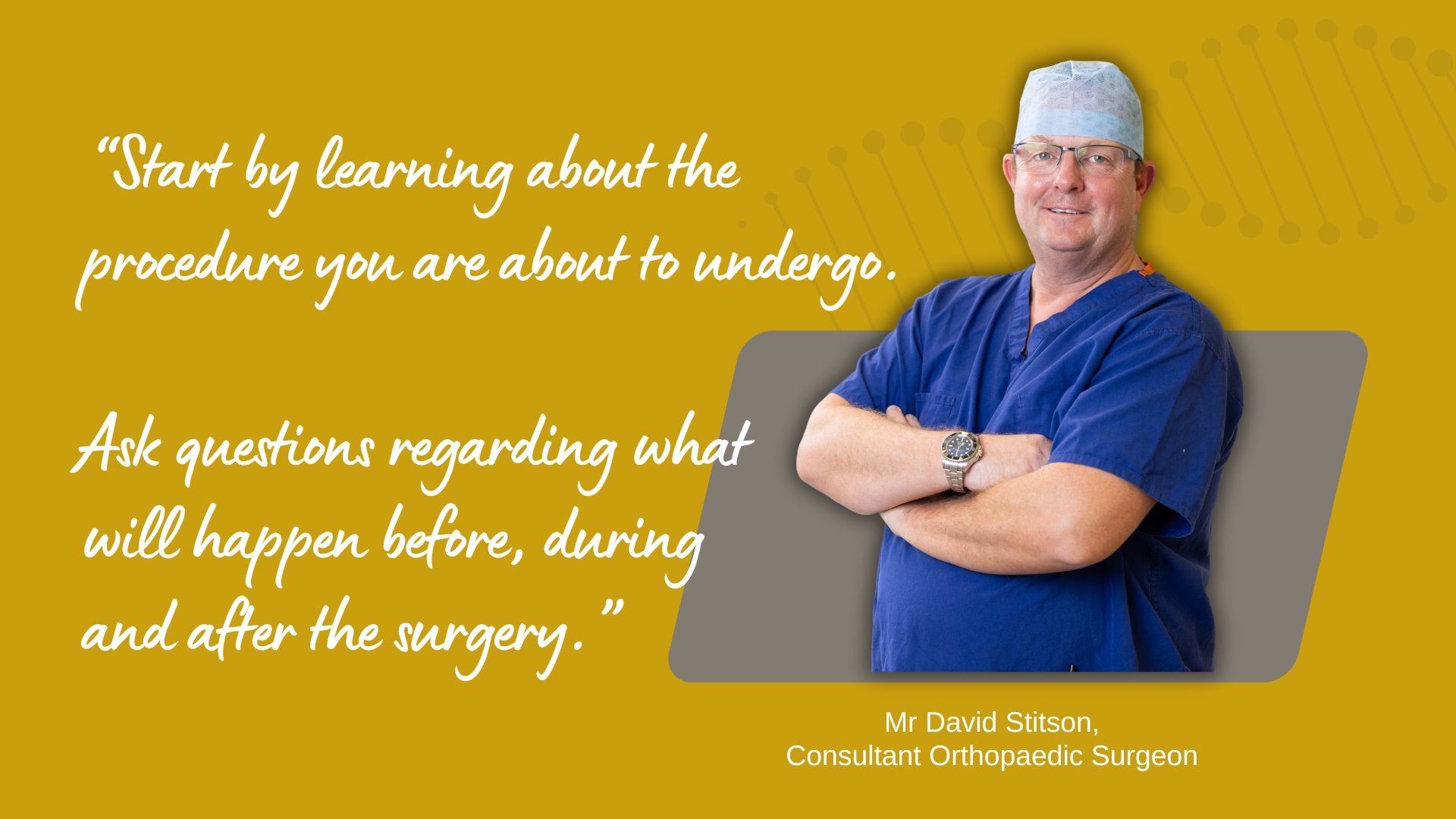We often see patients who have joint pain be it hip or knee and put off their treatment because of fear of surgery. As a result, not all hip or knee problems are treated at an optimal time, something that can adversely affect the outcome.
Whether it is the uncertainty of the procedure, fear of the unknown or fearing the discomfort of recovery, it is entirely natural to feel anxious. This fear of surgery, also known as surgery anxiety, is more common than you may think.
Contents
ToggleUnderstanding that you are not alone in these feelings is crucial. Through this blog, we will explore practical and compassionate strategies to help ease these fears, support your emotional wellbeing and prepare you for a smoother surgical journey.
Understanding the Fear of Surgery
Surgery, even when routine, can be a daunting prospect for many of us. The thought of placing one’s health in the hands of another can bring a series of challenging emotions. These apprehensions are perfectly normal, yet understanding the roots of the fear can make a world of difference in managing it.
Common Causes of Surgery Anxiety
Surgery anxiety, or preoperative anxiety, stems from various sources and influences. One common cause is the fear of the unknown. Surgery can involve complex procedures that are difficult to comprehend fully, leading to nerves and apprehension. Many people also worry about potential complications, despite often being rare, which can greatly contribute to heightened anxiety levels.
The fear of pain is another significant factor. No one looks forward to discomfort and the anticipation of postoperative pain can intensify anxiety. Additionally, some individuals experience concern over the loss of control while under anaesthesia, fearing vulnerability or imagining waking up mid-procedure. These worries, though understandable, are generally unfounded thanks to modern medicine’s advancements and vigilant professional care.
The Psychological Impact of Surgery Fear
Such fears do not just flutter away—they can deeply affect mental health if left unaddressed. Anxiety can manifest physically, causing symptoms such as heart palpitations, sweating or even shortness of breath. This may spiral into feelings of dread or panic, impacting one’s ability to think clearly or to make decisions. These experiences can, over time, progress towards depression as concerns amplify.
The psychological impact can extend beyond the surgery itself. Prolonged anxiety might affect recovery times and cloud the weeks approaching the procedure. Understanding these impacts will empower you to take proactive steps towards managing them, ensuring that fear does not overpower the necessities of the surgery and recovering from it.
Preparing Mentally for Surgery
Mental preparation is a crucial aspect of navigating the surgical process. With the right strategies it is indeed possible to mitigate worries and approach your health with confidence and calm.
Gathering Information and Setting Expectations
Knowledge is a powerful tool in battling fear. Start by learning about the procedure you are about to undergo. Ask questions regarding what will happen before, during and after the surgery. Understanding the process demystifies it and helps set realistic expectations. For instance, being aware of typical recovery times, post-surgery symptoms or how pain is managed assists in reducing surprises and misconceptions.
To aid in clarity, consider creating a list of questions to discuss with your healthcare provider. Queries might focus on anaesthesia, the surgeon’s experience, or potential risks and benefits. Ensure the answers resonate with you and clear up any doubts you may hold.
Consulting with Healthcare Professionals
Engaging in open, frank conversations with your healthcare team can be remarkably reassuring. Surgeons, anaesthetists and nurses have a wealth of knowledge to share about what to expect and how best to prepare. They are there to support you and can offer practical advice tailored to your specific condition and personal circumstances.
Do not hesitate to express your fears or emotions. Medical professionals can offer reassurance and validation, addressing procedural concerns while also considering your emotional wellbeing. Some hospitals also have psychologists or counsellors on staff, skilled at helping patients manage anxiety. Their insights can equip you with coping mechanisms designed to quell anxiety effectively.
Building a Support System
No one should face surgery alone. Lean on friends, family or loved ones as a source of comfort before and after the procedure. Sharing your concerns can be incredibly cathartic and can help reduce feelings of isolation.
Consider forming a practical plan with your support network. For example:
– Arrange for someone to accompany you to the hospital and be there when you wake up.
– Discuss logistical aspects like school or work arrangements, child or pet care and meal planning during your recovery phase.
This collaborative approach ensures you feel backed by others and can provide simple peace of mind.
Additionally, connecting with others who have undergone similar surgeries can be remarkably informative and reassuring. Online forums or local support groups offer spaces where you can share experiences and gather tips from individuals who truly understand what you’re going through.
By understanding your fears and enacting thoughtful preparation steps, you can transform your surgical journey into one that prioritises your wellness and peace of mind. Your courage and willingness to face those nerves head-on form the bridge to a safer, calmer surgical experience. Take heart in the process—each step paves the way toward healing and health.
3 Calming Techniques You Can Use Prior to Surgery
Facing surgery can be daunting and the accompanying fear can feel overwhelming. Yet, embracing techniques to calm your mind and body might help to ease these anxieties. By practising methods that promote relaxation and peace, you can transform your experience, making it smoother and more manageable.
1. Relaxation and Breathing Exercises
A powerful tool in your calming arsenal is the use of relaxation and breathing exercises. Breathing deeply and steadily can help slow your heart rate and lower your blood pressure, fostering a sense of calm. Here’s a simple exercise to try:
– Find a quiet place: Sit or lie down in a comfortable position.
– Close your eyes: Allow your body to become heavy and relax.
– Inhale deeply through your nose: Count to four as you breathe in, filling your lungs with air.
– Hold your breath: Gently hold your breath for a moment.
– Exhale slowly through your mouth: Count to four as you release the air slowly and completely.
– Repeat: Continue this cycle for several minutes.
Engaging in this routine regularly can help to centre your mind and bring tranquillity, easing anxious thoughts about the upcoming procedure.
2. Mindfulness and Meditation Practices
Mindfulness and meditation practices also offer immense benefits in calming surgery-related fears. These techniques emphasise being present in the moment, which can diminish worries about what lies ahead.
– Mindfulness practices: Involve engaging fully with current experiences and sensations. You might focus on tasting your food or noticing the feel of the ground under your feet as you walk.
– Guided meditation: Use apps or online resources to follow guided meditations that lead you through calming and positive visual imagery, helping to divert your focus from stress.
By making mindfulness and meditation a part of your routine, you can foster resilience and emotional equilibrium, leading to enhanced peace and readiness for surgery.
3. Visualisation Techniques
Another effective approach is employing visualisation techniques. Visualisation involves creating vivid, detailed mental images to promote calmness and control. For surgery, this technique might look like:
– Envisioning a positive outcome: Imagine yourself waking from surgery, feeling relieved and well.
– Creating a mental sanctuary: Picture a peaceful place where you feel safe and relaxed, such as a quiet beach or a serene garden. Use all your senses to make it as real as possible.
– Visualising the surgical process as smooth and successful: Picture the medical team skilled and caring, and imagine yourself in the best of health post-surgery.
When practised regularly, visualisation can enhance your confidence and reduce anxiety, preparing you mentally and emotionally for surgery.
By incorporating these calming techniques into your life, you can nurture a deeper sense of calm and readiness, making the approach to surgery less intimidating and more hopeful.
Anxiety About Surgery FAQs
When anxiety about surgery looms large, having answers at your fingertips can be incredibly reassuring. Here are some frequently asked questions that might ease your mind:
Q: Is it normal to feel scared before surgery?
A: Absolutely. Surgery is a significant event and it is normal and natural to have concerns. Many individuals feel apprehensive, but addressing these feelings and seeking support can help immensely.
Q: What should I bring to the hospital?
A: It’s wise to pack essentials such as comfortable clothing, personal toiletries and perhaps a book or music to help keep your mind at ease. Ensure you also have all necessary medical documents.
READ: Orthopaedic Pre-surgery Checklist
Our pre-surgery checklist is a simple way for patients to check that they are prepared so they’ll feel as relaxed and confident as possible prior to a procedure.
Q: How can I calm my nerves before the procedure?
A: Consider relaxation techniques like deep breathing exercises, meditation or gentle yoga. Having a conversation with Mr Stitson or the pre-assessment team to clarify any doubts may also significantly reduce anxiety.
Facing surgery can be daunting but equipping yourself with information and strategies can transform fear into confidence. Remember, you’re not alone, and there is abundant support available to guide you through this journey.
About Hip Surgery
Total hip replacement surgery replaces the worn-out painful and stiff hip joint with a new prosthetic joint. This procedure is normally performed under spinal anaesthesia and is commonly followed by a night or two in the hospital. Day-case hip replacement surgery may be an appropriate option for you.
About Knee Surgery
Knee replacement surgery replaces the worn out, painful and stiff knee joint with a new prosthetic joint. This procedure which may be a partial or a total replacement is normally performed under spinal anaesthesia and is usually followed by a night or two in the hospital. Day-case knee replacement surgery may be an appropriate option for you.

About Mr Stitson
David Stitson is a Plymouth-based Consultant Trauma and Orthopaedic Surgeon. Trained both in the UK and internationally, he has worked in medicine for more than 20 years for the NHS, for the Royal Air Force and in private practice. Mr Stitson operates privately at the Nuffield Health Hospital, Plymouth.







